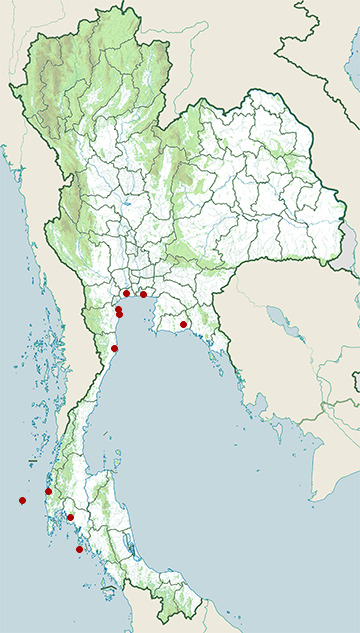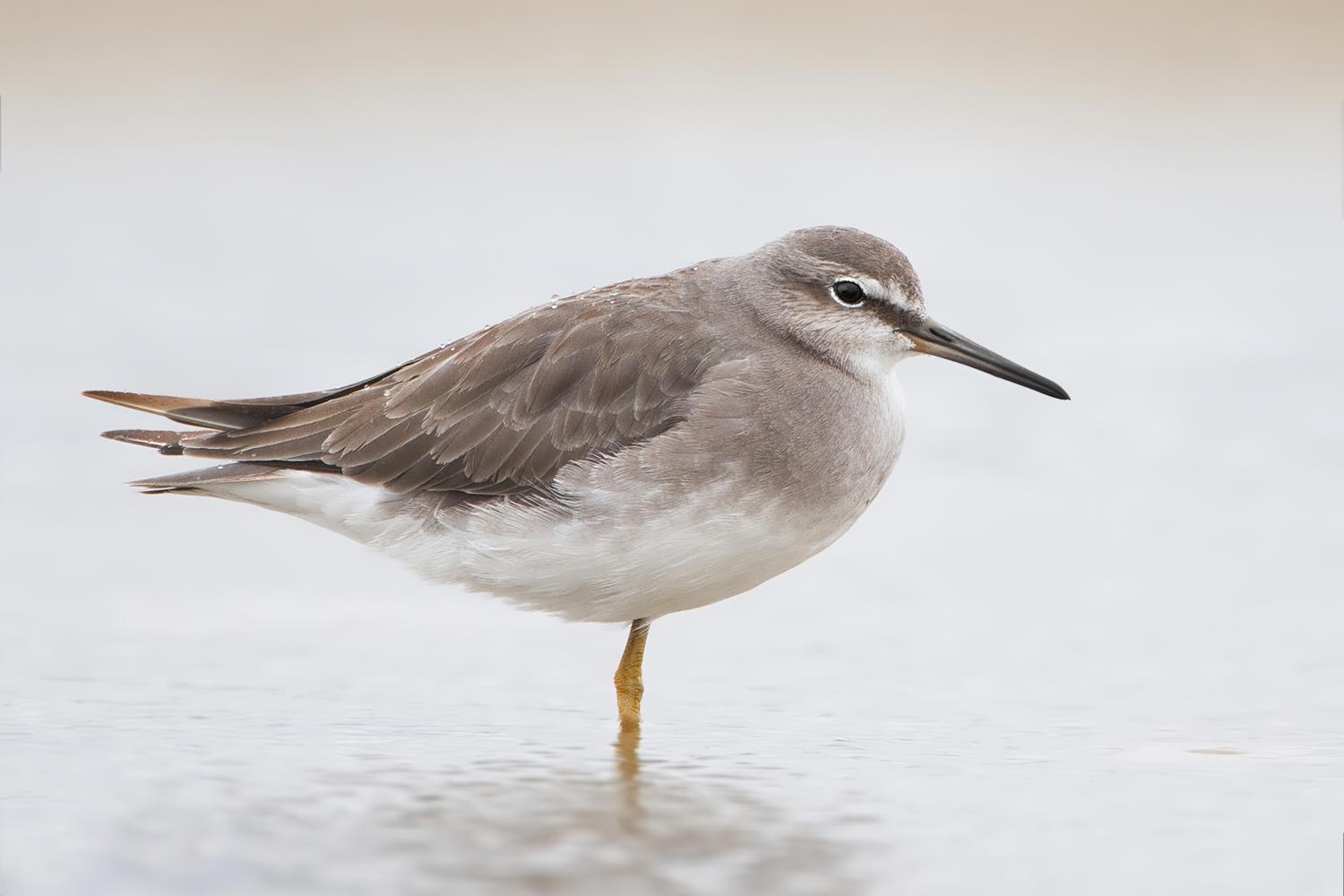Species of Thailand
Grey-tailed tattler
Tringa brevipes
Louis Jean Pierre Vieillot, 1816
In Thai: นกตีนเหลือง
The grey-tailed tattler or Polynesian tattler, Tringa brevipes (formerly Heteroscelus brevipes) is a small, foraging shorebird in the genus Tringa. The English name for the tattlers refers to their noisy call. The genus name Tringa is the New Latin name given to the green sandpiper by Aldrovandus in 1599 based on Ancient Greek trungas, a thrush-sized, white-rumped, tail-bobbing wading bird mentioned by Aristotle. The specific brevipes is from Latin brevis, "short", and pes, "foot".
This tattler breeds in northeast Siberia. After breeding, they migrate to an area from southeast Asia to Australia.
Description
The grey-tailed tattler is closely related to its North American counterpart, the wandering tattler (T. incana) and is difficult to distinguish from that species. Both tattlers are unique among the species of Tringa for having unpatterned, greyish wings and back, and a scaly breast pattern extending more or less onto the belly in breeding plumage, in which both also have a rather prominent supercilium.
These birds resemble common redshanks in shape and size. The upper parts, underwings, face and neck are grey, and the belly is white. They have short yellowish legs and a bill with a pale base and dark tip. There is a weak supercilium.
They are very similar to their American counterpart, and differentiation depends on details like the length of the nasal groove and scaling on the tarsus. The best distinction is the call; grey-tailed has a disyllabic whistle, and wandering a rippling trill.
Behaviour
Its breeding habitat is stony riverbeds in northeast Siberia. It nests on the ground, but these birds will perch in trees. They sometimes use old nests of other birds as well.
Grey-tailed tattlers are strongly migratory and winter on muddy and sandy coasts from southeast Asia to Australia. They are very rare vagrants to western North America and western Europe. These are not particularly gregarious birds and are seldom seen in large flocks except at roosts.
These birds forage on the ground or water, picking up food by sight. They eat insects, crustaceans and other invertebrates.
Australia
Grey-tailed tattlers are not listed as "threatened" on the Australian Environment Protection and Biodiversity Conservation Act 1999.
The grey-tailed tattler is listed as "threatened" on the Victorian Flora and Fauna Guarantee Act (1988). Under this Act, an Action Statement for the recovery and future management of this species has not been prepared. On the 2007 advisory list of threatened vertebrate fauna in Victoria, the grey-tailed tattler is listed as critically endangered.
This article uses material from Wikipedia released under the Creative Commons Attribution-Share-Alike Licence 3.0. Eventual photos shown in this page may or may not be from Wikipedia, please see the license details for photos in photo by-lines.
Category / Seasonal Status
Wiki listed status (concerning Thai population): Rare on passage
BCST Category: Recorded in an apparently wild state within the last 50 years
BCST Seasonal status: Non-breeding visitor
Scientific classification
- Kingdom
- Animalia
- Phylum
- Chordata
- Class
- Aves
- Order
- Charadriiformes
- Family
- Scolopacidae
- Genus
- Tringa
- Species
- Tringa brevipes
Common names
- English:
- Gray-tailed tattler
- Grey-tailed tattler
- Siberian tattler
- Siberian grey-tailed tattler
- French: Chevalier de Sibérie
- Thai: นกตีนเหลือง
Synonyms
- Tringa brevipes, Les Christidis & Walter E. Boles (2008)
- Tringa brevipes, AOU Checklist (1998)
- Tringa brevipes, Evan Graham Turbott (1990)
- Tringa brevipes, Charles Gald Sibley & Burt Leavelle Monroe (1990)
- Heteroscelus brevipes, Louis Jean Pierre Vieillot (1816)
Conservation status

Near Threatened (IUCN3.1)

Near Threatened (BirdLife)

Near Threatened (ONEP)

Near Threatened (BCST)
Photos
Please help us review the bird photos if wrong ones are used. We can be reached via our contact us page.
Range Map

- Bang Pu Recreation Centre
- Khao Sam Roi Yot National Park
- Klaeng District, Rayong
- Ko Lanta National Park
- Laem Pak Bia
- Mueang Krabi District, Krabi
- Mueang Samut Sakhon District, Samut Sakhon
- Pak Thale
- Similan Islands
- Takua Pa District, Phang Nga
